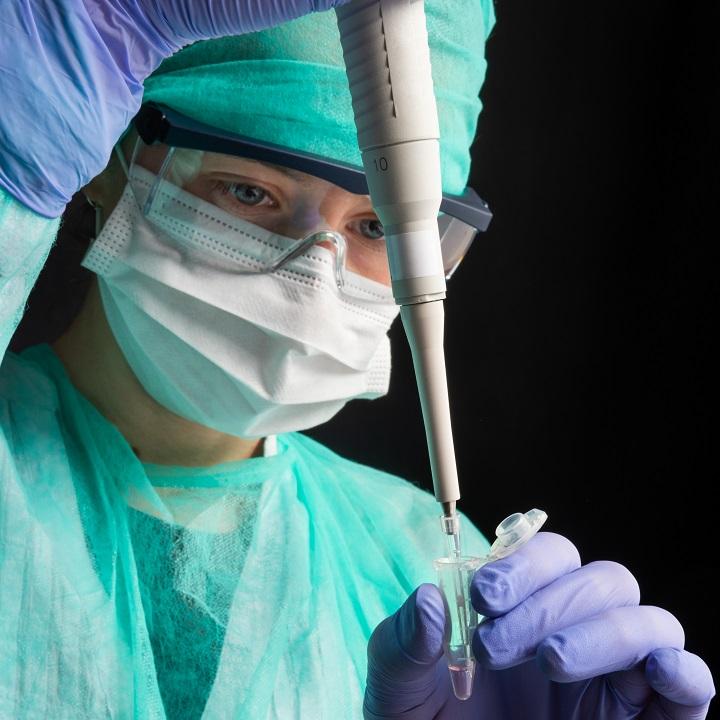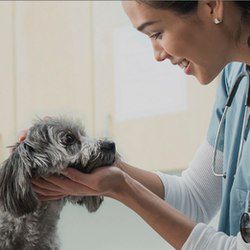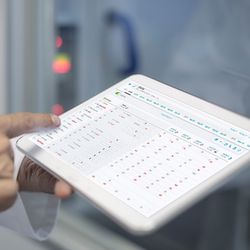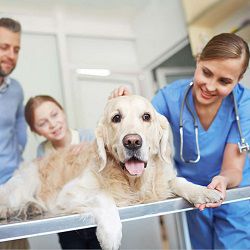IDEXX Reference Laboratories
DISCOVER MORE

IDEXX SARS-CoV-2
(COVID-19) RealPCR Test
For rare cases in consultation with your public health authority
In rare cases where the three specific criteria below are met, this test offers veterinarians the opportunity to bring pet owners the peace of mind their pet is negative or intervene and provide their patient with highest standard of care should they test positive.
- Pet is living in a household with a human who has COVID-19 or has tested positive for the SARS-CoV-2 coronavirus
- Pet has already been tested for more common infections, which a veterinarian has ruled out
- Pet (especially cats and ferrets) is showing clinical signs consistent with COVID-19
For use in rare cases to confirm or rule out COVID-19 infection in pets
Leading health authorities and IDEXX veterinarians agree that transmission of the SARS-CoV-2 virus is primarily person to person and advise against testing asymptomatic pets. In symptomatic pets, it is more likely that disease is caused by a more common respiratory infection than by COVID-19.14
While there is currently no evidence that dogs or cats play a role in transmitting the disease to humans, growing clinical evidence suggest there may be varying levels of susceptibility to infection in animals. Recent peer-reviewed research also showed cats and ferrets may be more susceptible to clinical infections while dogs seem generally more resistant to infection.8-11
When to test
Leading health authorities and IDEXX veterinarians agree that transmission of the SARS-CoV-2 virus is primarily person to person and advise against testing asymptomatic pets. In symptomatic pets, it is more likely that disease is caused by a more common respiratory infection than by COVID-19.14
IDEXX's guidance, aligned with that of medical experts, is that veterinarians order the IDEXX SARS-CoV-2 (COVID-19) RealPCR Test after consultation with a public health authority (for example, a state public health veterinarian in the United States) and these three specific criteria are met:
- Pet is living in a household with a human who has COVID-19 or has tested positive for the SARS-CoV-2 coronavirus
- Pet has already been tested for more common infections, which a veterinarian has ruled out
- Pet (especially cats and ferrets) is showing clinical signs consistent with COVID-19
For more detailed information, please see our diagnostic update.
IDEXX wholly endorses the recommendation of the American Veterinary Medical Association (AVMA) found on their website that states, "Companion animals should not be routinely tested for COVID-19 at this time. Animals that are ill or injured should receive veterinary care. Where appropriate, testing for infectious diseases and other conditions that commonly cause companion animal illness should be conducted. If a new, concerning illness is observed that cannot be otherwise explained, and the companion animal has had close and prolonged contact with a person with confirmed or suspected COVID-19 infection, the veterinarian should contact the state public health veterinarian or designated state animal health official to discuss whether or not there is a need to test that animal for COVID-19." More detailed information on testing recommendations can be found on the AVMA website.
How to order
Special instructions for submitting specimens for the IDEXX SARS-CoV-2 (COVID-19) RealPCR Test
All IDEXX SARS-CoV-2 (COVID-19) RealPCR Test specimens should be submitted directly to the IDEXX Molecular Diagnostics (PCR) Laboratory in Sacramento, CA, via either FedEx or UPS. Shipping labels, supplies and PCR swabs for COVID-19 testing are available via IDEXX Online Orders.
Note: To set up an IDEXX Online Orders Account or FedEx or UPS account, please contact the IDEXX Inside Sales Center at 1-888-79-IDEXX (888-794-3399).
IDEXX Direct customers: Do not use your pre-printed labels. Please fill out a blank FedEx or UPS shipping label with your current IDEXX account billing information, and send specimens to the following address:
IDEXX Sacramento
2825 KOVR Dr.
West Sacramento, CA 95605
Phone: 1-800-444-4210
Not an IDEXX customer? Please contact a representative for assistance in setting up an account.
Test names and codes
Test code: 8826 |
IDEXX SARS-CoV-2 (COVID-19) RealPCR Test |
Test code: 88261 |
IDEXX SARS-CoV-2 (COVID-19) RealPCR Test Add-onAdd on to a prior RealPCR test or panel |
Test for more common causes of respiratory illness to be considered prior to testing for SARS-CoV-2 (COVID-19)
Upper Respiratory Disease (URD) RealPCR Panel
Bordetella bronchiseptica, Chlamydophila felis, feline calicivirus, feline herpesvirus type 1 (FHV-1) Quant, H7N2 avian influenza virus, influenza A virus (includes H3N2, H1N1, H3N8) and Mycoplasma felis RealPCR tests. Includes quantification of feline herpesvirus type 1 (FHV-1) viral particles if PCR positive. Includes strain identification of influenza A if PCR positive.
| 2512—Feline |
Respiratory Disease (CRD) RealPCR Panel (Comprehensive)
Bordetella bronchiseptica, canine adenovirus type 2, canine distemper virus (CDV) Quant, canine herpesvirus type 1 (CHV-1), canine parainfluenza virus, canine pneumovirus, canine respiratory coronavirus (CRCoV), H3N2 canine influenza virus, influenza A virus (includes H1N1, H3N2, H3N8, H7N2), Mycoplasma cynos and Streptococcus equi subsp. zooepidemicus RealPCR tests. Includes quantification of distemper viral particles if PCR positive. Includes strain identification of influenza A if PCR positive.
| 2524—Canine |
Influenza Virus RealPCR Panel
H1N1 pandemic influenza virus, H3N2 canine influenza virus, H3N8 canine influenza virus, and influenza A virus RealPCR tests. Includes strain identification of influenza A if PCR positive.
| 3731—Canine/Ferret |
Specimen submission guidelines
SARS-CoV-2 specimen collection guidelines
It is encouraged to consult with your state public health veterinarian or the AVMA for latest guidelines on safely collecting specimens prior to testing for SARS-CoV-2 in a pet. The use of personal protective equipment (PPE) including gloves, mask, gown and eye protection is recommended when collecting specimens from a pet in which SARS-CoV-2 infection is suspected.
The ideal specimen should be based on clinical presentation and purpose for testing.
- For respiratory manifestations: deep pharyngeal swab (with visible organic material on swab; please rub firmly) and a conjunctival swab (wipe eye clean, swab inside of eyelid), in the same tube. If the patient is cooperative, a swab from the caudal nasal cavity may also be included. Please submit dry, plastic-stemmed swabs, without transport media, in an RTT or an empty, sterile tube; keep refrigerated.
- For gastrointestinal manifestations: 3-5 g (1 g minimum) fresh feces in a sterile container and deep pharyngeal swab (with visible organic material on swab; please rub firmly) and a conjunctival swab (wipe eye clean, swab inside of eyelid), in the same tube. Please submit dry, plastic-stemmed swabs, without transport media, in an RTT or an empty, sterile tube; keep refrigerated.
- No distinct clinical signs (e.g. public health investigations): 3-5 g (1 g minimum) fresh feces in a sterile container and deep pharyngeal swab (with visible organic material on swab; please rub firmly), conjunctival swab (wipe eye clean, swab inside of eyelid), and caudal nasal swab, in the same tube.
Specimen requirements
Deep pharyngeal swab (with visible organic material on swab; please rub firmly) and a conjunctival swab (wipe eye clean, swab inside of eyelid), in the same tube. Please submit dry, plastic-stemmed swabs, without transport media, in an RTT or an empty, sterile tube; keep refrigerated.
Additional specimens for IDEXX SARS-CoV-2 (COVID-19) RealPCR test: if the patient is cooperative, a swab from the caudal nasal cavity may also be included. If gastrointestinal signs are present, also include 3-5 g (1 g minimum) fresh feces in a sterile tube.
Reporting requirements
What are the reporting requirements for a positive IDEXX SARS-CoV-2 (COVID-19) RealPCR Test?
COVID-19 is an internationally reportable disease. If a positive SARS-CoV-2 result is detected, the IDEXX RealPCR team will provide essential information as required by applicable law with public health and/or veterinary authorities (for example, to the state public health veterinarian in the United States). The submitting veterinarian is also responsible to report the positive result and plays a critical role in providing the additional clinical details and history about the patient. Positive IDEXX SARS-CoV-2 (COVID-19) RealPCR tests will be further confirmed at a third-party government laboratory, according to regulatory guidance.
Support and resources
Ordering your tests online
Did you know that you can search for diagnostic tests, create requisition, and review status on vetconnectplus.com?
Turnaround time
Preliminary results in 1-4 days; allow additional time for confirmation of SARS-CoV-2 PCR positive results.
Customer support services
IDEXX supports your practice with our customer support, technical support, and medical consulting services team, including our diagnostic support veterinarians and board-certified specialists.
1-888-433-9987

What is PCR?
Polymerase chain reaction (PCR) testing identifies the presence of a pathogen’s DNA or RNA in a patient specimen. PCR is highly sensitive and specific testing that can confirm the actual presence of an organism.
PCR results facilitate early detection of disease in sick animals:
- Often positive in infected animals before antibody can be detected

Additional resources
White paper: Clinical evidence suggesting varying levels of susceptibility to SARS-CoV-2 (COVID-19) virus infection in animals
White paper: Overview of IDEXX SARS-CoV-2 (COVID-19) RealPCR Test
Diagnostic resource: Coronavirus diagnostic update, April 2020
Public health and other non-customer inquiries: Click here
IDEXX Reference Laboratories
DISCOVER MORE
References
- Centers for Disease Control and Prevention. Coronavirus Disease 2019 (COVID-19). www.cdc.gov/COVID19. Accessed April 16, 2020.
- World Health Organization. Coronavirus disease (COVID-19) outbreak. www.who.int/emergencies/diseases/novel-coronavirus-2019. Accessed April 16, 2020.
- American Veterinary Medical Association. COVID-19: What veterinarians need to know. www.avma.org/coronavirus. Accessed April 16, 2020.
- World Small Animal Veterinary Association (WSAVA). The new coronavirus and companion animals—advice for WSAVA members. www.wsava.org/news/highlighted-news/the-new-coronavirus-and-companion-animals-advice-for-wsava-members. Accessed April 16, 2020.
- Ong SWX, Tan YK, Chia PY, et al. Air, surface environmental, and personal protective equipment contamination by serve acute respiratory syndrome coronavirus 2 (SARS-CoV-2) from a symptomatic patient [published online ahead of print March 4, 2020]. JAMA. 2020;e203227. doi:10.1001/jama.2020.3227
- van Doremalen N, Bushmaker Y, Morris DH, et al. Aerosol and surface stability of SARS-COV-2 as compared with SARS-CoV-1. N Engl J Med. 2020;382(16):1564–1567. doi:10.1056/NEJMc2004973
- Wan Y, Shang J, Graham R, Baric RS, Li F. Receptor recognition by the novel coronavirus from Wuhan: An analysis based on decade-long structural studies of SARS coronavirus. J Virol. 2020;94(7):e00127-20. doi:10.1128/JVI.00127-20
- Shi J, Wen Z, Zhong G, et al. Susceptibility of ferrets, cats, dogs and other domesticated animals to SARS-coronavirus 2. Science. 2020;eabb7015. doi:10.1126/science.abb7015
- Kim Y, Kim SG, Kim SM, et al. Infection and rapid transmission of SARS-CoV-2 in ferrets [published online ahead of print April 5, 2020]. Cell Host Microbe. 2020;S1931-3128(20)30187-6. doi:10.1016/j.chom.2020.03.023
- Questions and answers on the 2019 coronavirus disease (COVID-19): Surveillance and events in animals. World Organisation for Animal Health (OIE) website. www.oie.int/en/scientific-expertise/specific-information-and-recommendations/questions-and-answers-on-2019novel-coronavirus. Updated April 9, 2020. Accessed April 16, 2020.
- USDA Cases of SARS-CoV-2 in Animals in the United States. USDA Animal and Plate Health Inspection Service website. https://www.aphis.usda.gov/aphis/dashboards/tableau/sars-dashboard. Updated February 15, 2021. Accessed March 16, 2021.
- OIE Statement on COVID-19 and Mink. OIE World Organisation for Animal Health website. https://www.oie.int/en/for-the-media/press-releases/detail/article/oie-statement-on-covid-19-and-mink/. Accessed March 16, 2021.
- Low-level of infection with COVID-19 in pet dog [news release]. Hong Kong: Government of the Hong Kong Special Administrative Region; March 4, 2020. www.info.gov.hk/gia/general/202003/04/P2020030400658.htm. Accessed April 16, 2020.
- Journal of Small Animal Practice (2020), 1-7: Frequency of respiratory pathogens and SARS-CoV-2 in canine and feline samples submitted for respiratory testing in early 2020. doi: 10.1111/jsap.13300.
PCR testing is a service performed pursuant to an agreement with Roche Molecular Systems, Inc.



